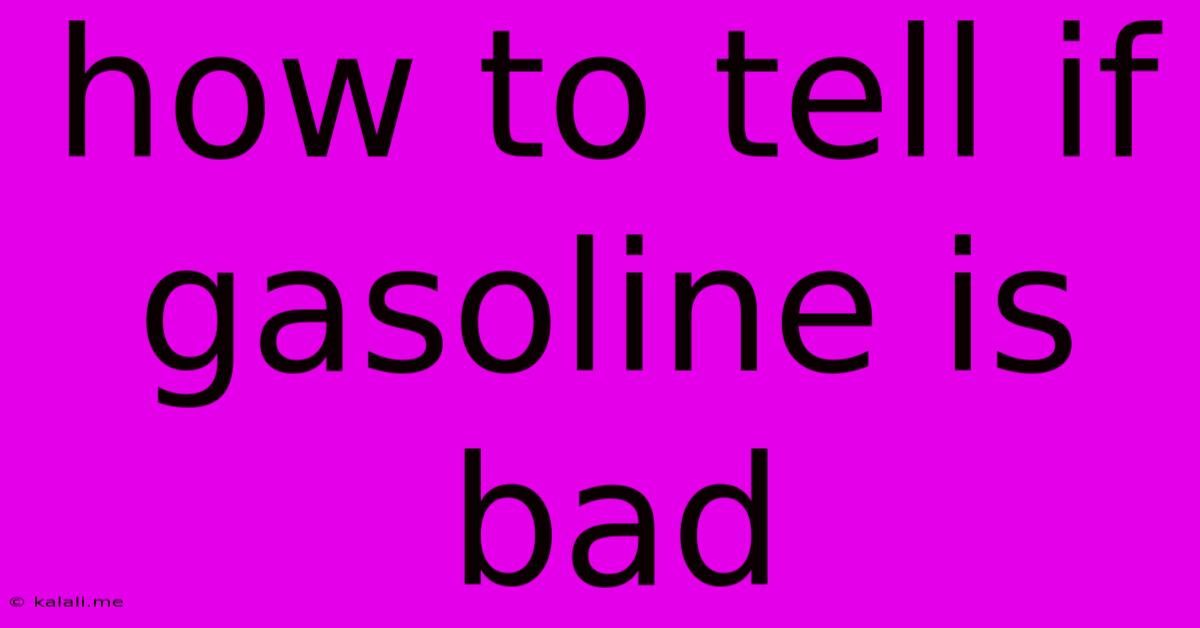How To Tell If Gasoline Is Bad
Kalali
Jun 05, 2025 · 3 min read

Table of Contents
How to Tell if Your Gasoline is Bad: A Comprehensive Guide
Meta Description: Learn how to identify bad gasoline! This guide covers common signs of fuel contamination, how to prevent it, and what to do if you suspect your gas is spoiled. We'll explore everything from smell and color to engine performance issues.
Dealing with bad gasoline is a frustrating experience, leading to costly repairs and inconvenient breakdowns. Knowing how to identify contaminated fuel early on is crucial for protecting your vehicle's engine. This comprehensive guide will help you recognize the telltale signs of spoiled gasoline and what steps to take if you suspect your fuel is bad.
Understanding Gasoline Degradation
Gasoline isn't indefinitely stable; it deteriorates over time, especially if exposed to air and moisture. This degradation process can result in a number of problems for your vehicle. Several factors contribute to gasoline going bad, including:
- Age: Older gasoline is more susceptible to oxidation and the formation of gums and varnish. Generally, gasoline starts to degrade after three to six months of storage.
- Exposure to Air: Oxygen reacts with gasoline components, leading to the formation of harmful residues.
- Moisture Contamination: Water in gasoline can cause corrosion and hinder combustion, leading to engine issues.
- Improper Storage: Storing gasoline in unsuitable containers or environments can accelerate degradation.
Key Signs of Bad Gasoline
Identifying bad gasoline can be tricky, as symptoms can vary. However, here are some key indicators to watch out for:
1. Unusual Smell: Fresh gasoline has a distinct, somewhat sweet odor. Bad gasoline may smell sour, musty, or have a pungent, almost chemical-like smell. This change in scent is often one of the earliest warning signs.
2. Discolored Fuel: Gasoline should be clear or slightly yellow. If you notice a cloudy, dark, or discolored appearance in your fuel tank, it's a strong indication of contamination. The presence of sediment or particles is also a significant red flag.
3. Engine Problems: Bad gasoline can cause various engine issues, such as:
- Difficulty Starting: The engine may crank slowly or refuse to start altogether.
- Rough Running: The engine might idle roughly, misfire, or experience a loss of power.
- Hesitation or Stalling: The vehicle might hesitate during acceleration or stall unexpectedly.
- Reduced Fuel Efficiency: You may notice a significant drop in your car's gas mileage.
4. Fuel System Issues: In severe cases, bad gasoline can lead to clogged fuel injectors, damaged fuel pumps, and other expensive fuel system problems. This is why addressing the issue swiftly is crucial.
5. Presence of Sediment: If you can visually inspect your fuel (perhaps through a clear fuel filter), the presence of any sediment or sludge is a definitive sign of contaminated fuel.
Preventing Bad Gasoline
Preventing gasoline degradation is easier than dealing with the consequences. Here are some preventative measures:
- Use Fresh Gasoline: Buy only the amount of gasoline you need and use it within a reasonable timeframe.
- Proper Storage: If you need to store gasoline, use an approved, airtight container designed specifically for fuel storage.
- Avoid Moisture: Keep your fuel containers sealed tightly and stored in a dry place.
- Regular Fuel System Maintenance: Regular maintenance, including fuel filter changes, helps prevent the accumulation of contaminants.
What to Do if You Suspect Bad Gasoline
If you suspect your gasoline is bad, avoid driving your vehicle. Attempting to run your engine with contaminated fuel can cause significant damage. Instead, take these steps:
- Do not add any more fuel.
- Contact a mechanic. A professional can diagnose the problem and recommend the appropriate course of action, which might include draining the fuel tank and cleaning or replacing affected components.
- Consider fuel treatment additives (with caution). Some fuel additives are designed to help clean fuel systems. However, always follow the manufacturer's instructions carefully.
By being aware of the signs of bad gasoline and taking proactive steps, you can protect your vehicle and avoid costly repairs. Remember, prevention is always the best cure!
Latest Posts
Latest Posts
-
Triangle That Has 2 Equal Sides
Jun 07, 2025
-
What Can I Substitute For An Egg In Meatloaf
Jun 07, 2025
-
How To Shut Off Gas To Stove
Jun 07, 2025
-
Fifty Shades Of Gray Book Quotes
Jun 07, 2025
-
Is The Refriegerant Still A Liquid After Metering Device
Jun 07, 2025
Related Post
Thank you for visiting our website which covers about How To Tell If Gasoline Is Bad . We hope the information provided has been useful to you. Feel free to contact us if you have any questions or need further assistance. See you next time and don't miss to bookmark.